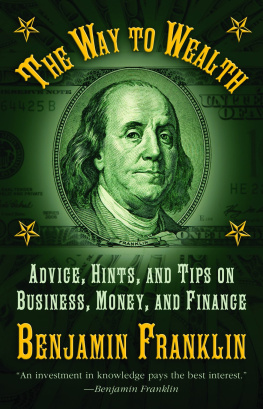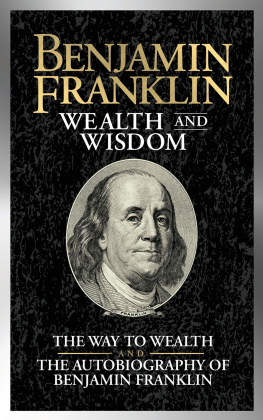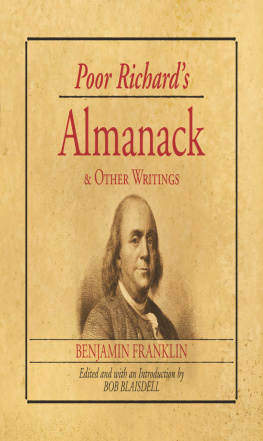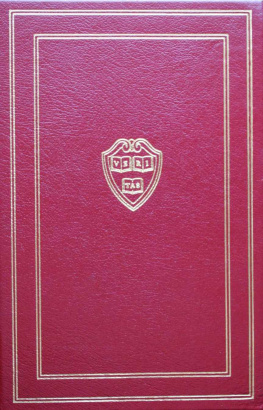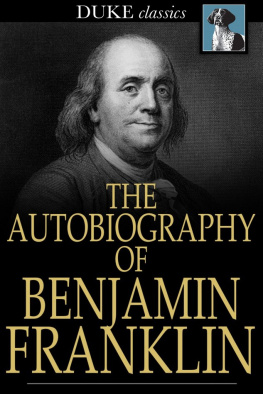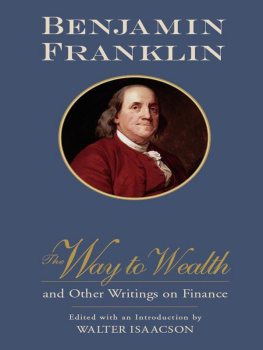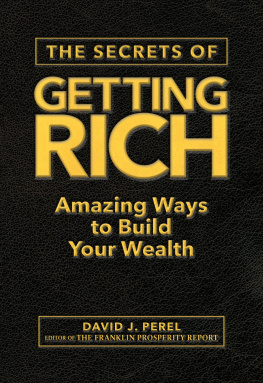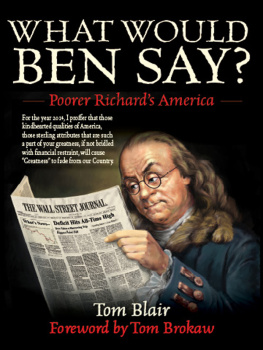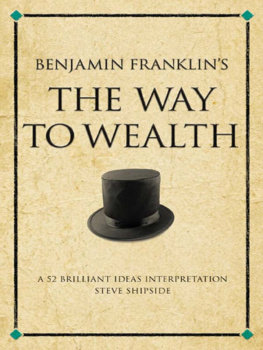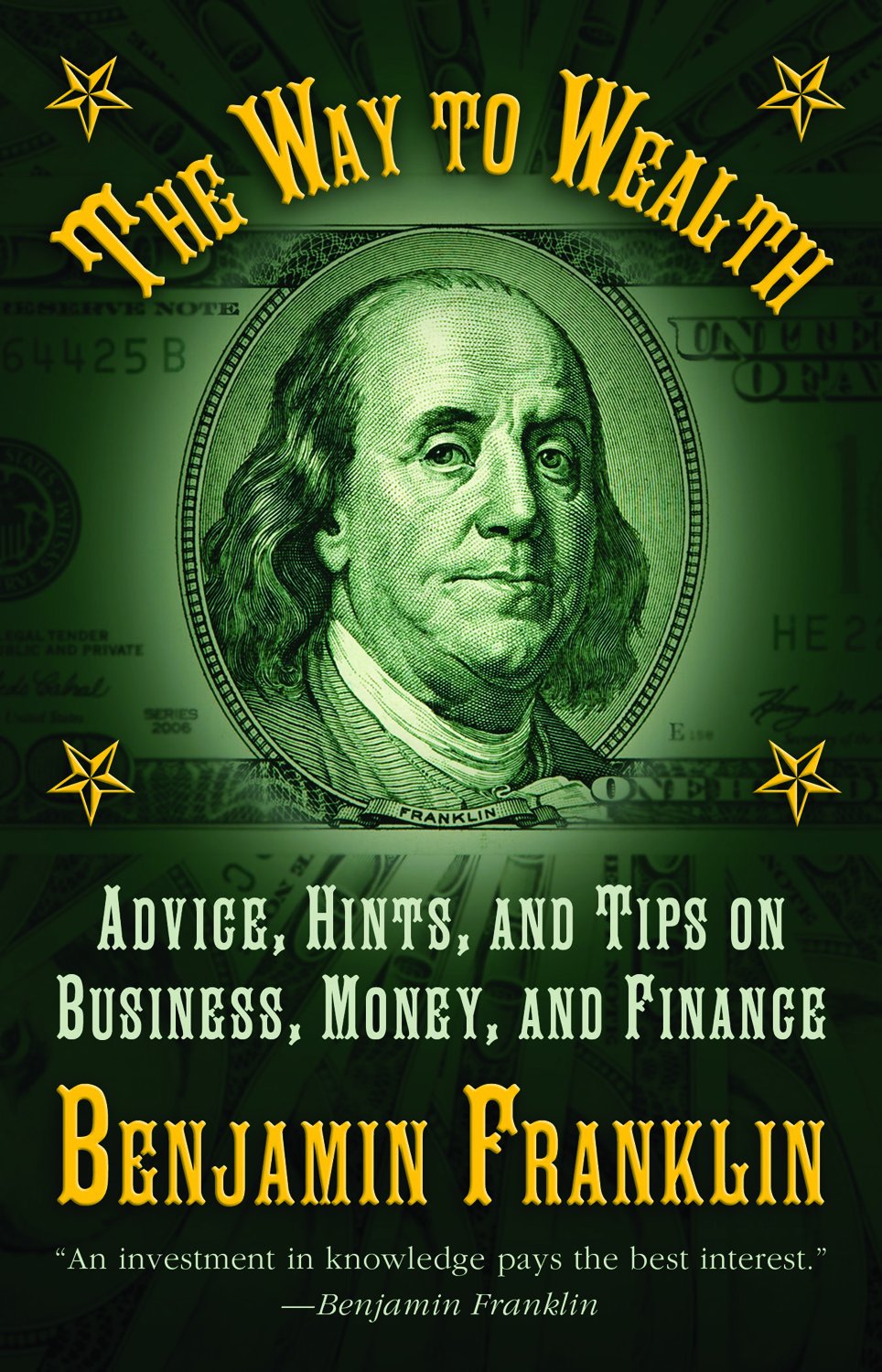From a letter to Mr. Benjamin Vaughan, dated at Passy, July 26th, 1784. From Memoirs of Benjamin Franklin; Written by Himself, 1847.
Truth is brighter than light. From Memoirs of Benjamin Franklin; Written by Himself, 1847.
Originally written for the London Chronicle , 1776.
A translation of this letter appeared in one of the daily papers of Paris [ Journal de Paris ] about the year 1784. The following is the original piece, with some additions and corrections made in it by the author. From The Works of Benjamin Franklin, Containing Several Political and Historical Tracts Not Included in any Former Edition, and Many Letters Official and Private Not Hitherto Published , 1882.
This is one of the authors earliest compositions, it having been written at the beginning of his twenty-third year. It is indeed the first tract of a political nature, which is known to have come from his pen, and although it was published anonymously, yet he afterwards avowed the authorship in his autobiography, where he thus speaks.
There was a cry among the people for more paper money; only fifteen thousand pounds being extant in the province, and that soon to be sunk. The wealthy inhabitants opposed any addition; being against all paper currency, from the apprehension that it would depreciate as it had done in New England, to the injury of all creditors. We had discussed this point in our junto, where I was on the side of an addition; being persuaded that the first small sum struck in 1723 had done much good by increasing the trade, employment, and number of inhabitants in the province; since I now saw all the old houses inhabited, and many new ones building; whereas I remembered well when I first walked about the streets of Philadelphia, (eating my roll), I saw many of the houses in Walnut Street, between Second and Front Streets, with bills on their doors To be let; and many likewise in Chestnut Street and other streets; which made me think the inhabitants of the city were one after another deserting it. Our debates possessed me so fully on the subject, that I wrote and printed an anonymous pamphlet on it, entitled, The Nature and Necessity of a Paper Currency. It was well received by the common people in general; but the rich men disliked it, for it increased and strengthened the clamor for more money; and, they happening to have no writers among them that were able to answer it, their opposition slackened, and the point was carried by a majority in the House. My friends there, who considered I had been of some service, thought fit to reward me, by employing me in printing the money; a very profitable job, and a great help to me. This was another advantage gained by my being able to write.
The utility of this currency became, by time and experience, so evident, that the principles upon which it was founded were never afterwards much disputed; so that it grew soon to fifty-five thousand pounds, and in 1739 to eighty thousand pounds, trade, building, and inhabitants all the while increasing. Though I now think there are limits beyond which the quantity may be hurtful.
This enquiry bears the marks of the authors characteristic acuteness and sagacity, but contains some of the fallacies, which were then common in the colonies on the subject of paper money. Occasionally the arguments are addressed more to the popular prejudices, than to the good sense and intelligence of readers, though there is no doubt that Franklin was sincere in supporting the doctrines of the advocates of the paper-money system. He subsequently expressed the same opinions in his examination before the committee of the House of Commons in 1766. This essay is curious, as showing his early impressions, and the rudiments of his thinking upon subjects, which occupied his mind and employed his pen, to a very considerable extent, in the mature period of his life. Editor. From The Works of Benjamin Franklin, Containing Several Political and Historical Tracts Not Included in any Former Edition, and Many Letters Official and Private Not Hitherto Published , 1882.
Some obscurity is thrown over this paragraph by confounding low price with want of demand, and high price with briskness of demand, things which often go together, and which are now, as formerly, often confounded with eachother, though they are by no means identical, one being the cause, the other the effect, respectively; for the increase of demand, out of proportion to that of the supply, increases price, and the reduction of demand, out of proportion to that of supply, reduces price. This inaccuracy, combined with another, which we shall soon meet with in this essay, namely, the confounding of circulating medium, or money, with capital generally; and also another nearly allied to it, namely, the confounding of the amount of capital ready to be loaned, with that of the circulating medium, led to many of the fallacies, which were prevalent in Franklins time in subjects of political economy, and which have, to this day, not wholly disappeared from similar speculations. The propositions really in question in this part of the essay are, that briskness of trade promotes production and consequently wealth, and that plenty, or rather a sufficiency, of circulating medium promotes trade, and a want of it, on the other hand, obstructs trade. These propositions are sufficiently plain, and are indisputable, and they constitute the authors premises or postulates, but they will not be found to lead to all his conclusions. W. Phillips. From The Works of Benjamin Franklin, Containing Several Political and Historical Tracts Not Included in any Former Edition, and Many Letters Official and Private Not Thitherto Published , 1882.
This proposition is true, and yet it tends to leave a wrong impression on the mind; for money, like ships, is an instrument of trade, and, like ploughs, is an instrument of production, and the more facilities for trade and production, and consequently for obtaining wealth, the country afforded, the greater were the inducements to emigrate to it. The quality of the ships, and ploughs, &c., is as important as the number. Just so of the circulating medium; the soundness of the currency is quite as important as its abundance. The error left upon the mind by the above language, and it is a very common one, is, that there is some predominant and almost magical effect belonging to a circulating medium, as distinguished from other instruments and facilities of production and trade, and their result, wealth; whereas the quantity of even a sound currency is not decisive of the prosperity of a country, as might be seen in Franklins time in some of the South American provinces. W. Phillips. From The Works of Benjamin Franklin, Containing Several Political and Historical Tracts Not Included in any Former Edition, and Many Letters Official and Private Not Hitherto Published , 1882.
Franklin states this doctrine in 1729, precisely as Adam Smith does forty-six years afterwards in The Wealth of Nations. W. Phillips. From The Works of Benjamin Franklin, Containing Several Political and Historical Tracts Not Included in any Former Edition, and Many Letters Official and Private Not Hitherto Published , 1882.
This passage shows that the theory, as to the effect of the South American mines upon the rate of money prices and the reduction of the value of the precious metals, so elaborately set forth and reasoned out by Adam Smith, was quite a familiar notion when he was but six years old; the correctness of which, however, to the extent laid down by Franklin in this place, and afterwards by Smith, has of late years been gravely questioned by very respectable writers. W. Phillips. From The Works of Benjamin Franklin, Containing Several Political and Historical Tracts Not Included in any Former Edition, and Many Letters Official and Private Not Hitherto Published , 1882.

